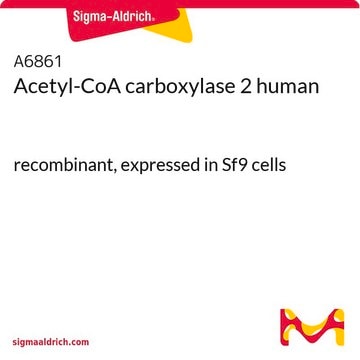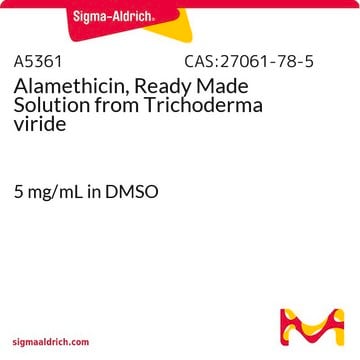Wichtige Dokumente
A6986
Acetyl-CoA Carboxylase 1 human
recombinant, expressed in Sf9 cells
Synonym(e):
ACCA
Größe auswählen
About This Item
Empfohlene Produkte
Allgemeine Beschreibung
Anwendung
Biochem./physiol. Wirkung
The Acetyl-CoA Carboxylase enzymes are activated by citrate, glutamate, and dicarboxylic acids and negatively regulated by long and short chain fatty acyl CoAs. Acetyl-CoA Carboxylase 1 is essential for breast cancer and prostrate cancer cell survival. Because of thier roles in fatty acid metabolism and oxidation, ACACA and ACACB are therapeutic targets for treating obesity and metabolic syndrome disorders.
Physikalische Eigenschaften
Einheitendefinition
Angaben zur Herstellung
Lagerklassenschlüssel
12 - Non Combustible Liquids
WGK
WGK 1
Flammpunkt (°F)
Not applicable
Flammpunkt (°C)
Not applicable
Hier finden Sie alle aktuellen Versionen:
Analysenzertifikate (COA)
Die passende Version wird nicht angezeigt?
Wenn Sie eine bestimmte Version benötigen, können Sie anhand der Lot- oder Chargennummer nach einem spezifischen Zertifikat suchen.
Besitzen Sie dieses Produkt bereits?
In der Dokumentenbibliothek finden Sie die Dokumentation zu den Produkten, die Sie kürzlich erworben haben.
Artikel
Fatty acid synthesis supports cancer cell proliferation, essential for membrane generation, protein modification, and bioenergetics.
Active Filters
Unser Team von Wissenschaftlern verfügt über Erfahrung in allen Forschungsbereichen einschließlich Life Science, Materialwissenschaften, chemischer Synthese, Chromatographie, Analytik und vielen mehr..
Setzen Sie sich mit dem technischen Dienst in Verbindung.








